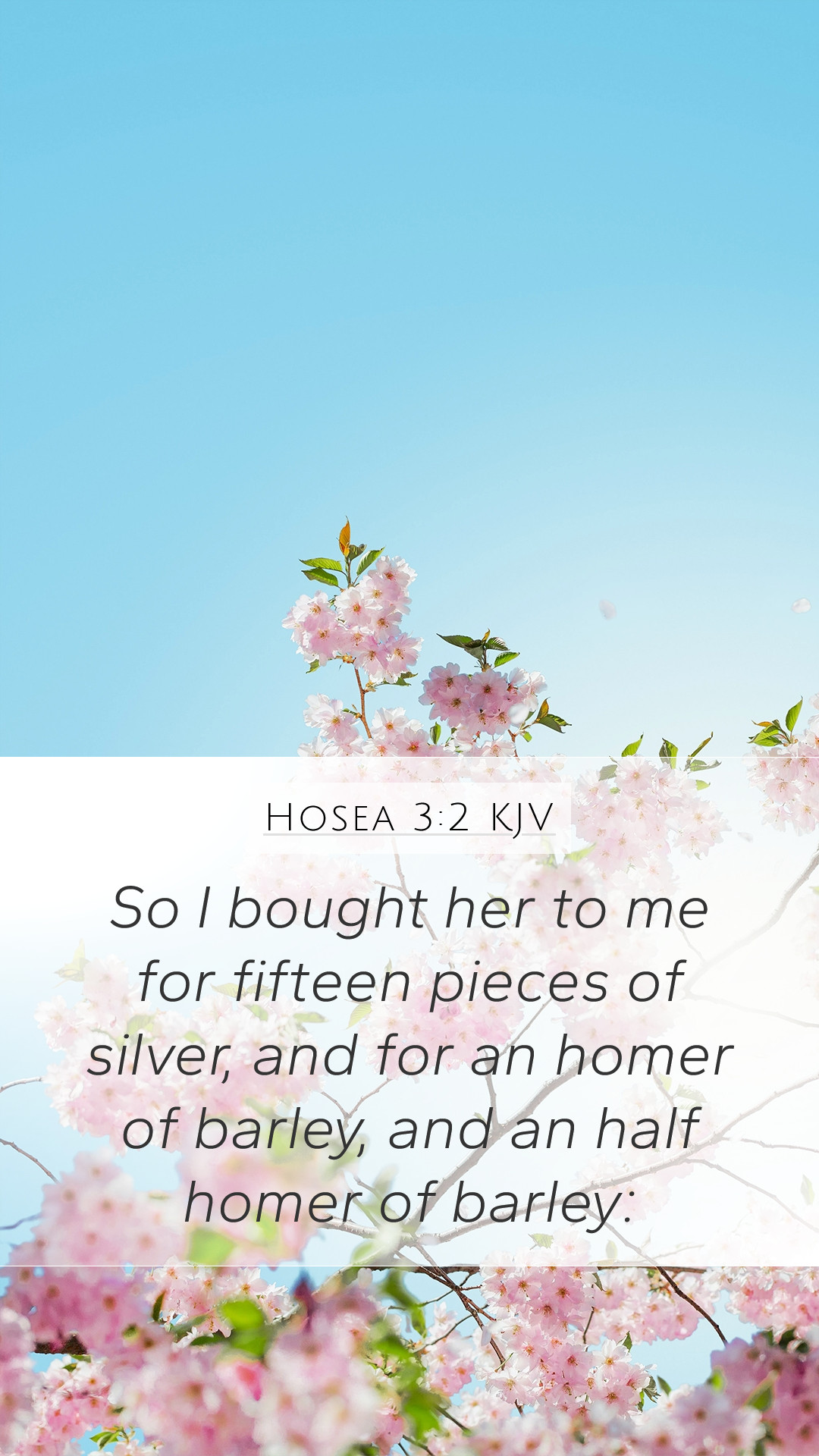Old Testament
Genesis Exodus Leviticus Numbers Deuteronomy Joshua Judges Ruth 1 Samuel 2 Samuel 1 Kings 2 Kings 1 Chronicles 2 Chronicles Ezra Nehemiah Esther Job Psalms Proverbs Ecclesiastes Song of Solomon Isaiah Jeremiah Lamentations Ezekiel Daniel Hosea Joel Amos Obadiah Jonah Micah Nahum Habakkuk Zephaniah Haggai Zechariah MalachiHosea 3:2 Meaning
What is the meaning of Hosea 3:2?
So I bought her to me for fifteen pieces of silver, and for an homer of barley, and an half homer of barley:
Hosea 3:2 Bible Verse Meaning
Bible Verse Meaning: Hosea 3:2
Verse Reference: Hosea 3:2 - "So I bought her for fifteen shekels of silver, and a homer and a lethech of barley."
Overview: The context of Hosea 3:2 is rooted in the prophet Hosea's relationship with his wife, Gomer, who symbolizes Israel's unfaithfulness to God. The act of purchasing her back signifies redemption, paralleling God's love for His people despite their waywardness. This verse captures profound themes of love, sacrifice, and restoration, relevant both in historical Israel and contemporary spiritual application.
Commentary Insights
Matthew Henry's Commentary
Matthew Henry emphasizes the depths of God's love illustrated in Hosea's actions. Just as Hosea redeems Gomer from her captivity, God seeks to redeem His people despite their sins. This commentary highlights the notion that true love may require sacrifice, and God’s relentless pursuit of His people mirrors a compassionate and forgiving heart.
Albert Barnes' Commentary
Albert Barnes offers insight into the cultural and economic implications of the purchase made by Hosea. The specific amounts (fifteen shekels and a homer and a lethech of barley) suggest the dire state of Gomer, reflecting the harsh realities faced in a life away from divine purpose. Barnes elucidates how this act serves as a powerful metaphor for God's realization of our lost state and His desire to bring us back into His grace.
Adam Clarke's Commentary
Adam Clarke provides an analytical view on the significance of the numerical values. The fifteen shekels of silver, a recognized price, denotes a modest sum for a slave, emphasizing the gravity of Gomer's fall. Clarke discusses how this redemption reflects God's unyielding commitment and provides a compelling metaphor of the way God views His covenant relationship with His people.
Understanding the Significance
The core message of Hosea 3:2 conveys God’s desire for reconciliation with His people. By purchasing Gomer back, Hosea becomes a symbol of God’s grace and mercy, which persists even in human unfaithfulness. This theme resonates throughout Scripture, portraying divine love as unwavering and determined.
Historical Context and Application
Understanding this verse requires a dive into the historical context of Israel during Hosea's time, characterized by idolatry and apostasy. The metaphor of marriage serves as a backdrop to assess how spiritual infidelity mirrored personal relationships. Applying the lessons from this verse allows believers to reflect on their commitments and the importance of remaining faithful in their walk with God.
Cross References
- Isaiah 54:5 - "For your Maker is your husband, the LORD Almighty is his name, the Holy One of Israel is your Redeemer; he is called the God of all the earth."
- Ezekiel 16:8 - "I passed by you and saw you kicking about in your blood, and as you lay there in your blood I said to you, 'Live!'
- Romans 5:8 - "But God demonstrates his own love for us in this: While we were still sinners, Christ died for us."
Conclusion
Hosea 3:2 stands as a powerful illustration of redemption and God's covenant love. In studying this verse, believers gain Bible verse interpretations that encourage a deeper understanding of God's enduring faithfulness and the call for His people to return to Him. This analysis enhances Bible study insights and enriches the reader’s journey in the faith.
For Further Study
As you explore this verse, consider engaging with Bible study groups or utilizing various Bible study tools to deepen your understanding. Approaching this with a mindset of prayer and reflection may provide new insights into how the message of Hosea can be applied to your life today.


